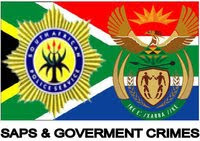

Some people work hard to make a fortune. Others just take one, writes Jana Marais
Dec 22, 2010 10:05 PM | By Jana Marais
Making millions just became a whole lot easier, with creative opportunists needing little more than a photocopier and an internet connection to make a fortune this year.
Share
IN THE DOCK: Sandile Majali
The alleged hijackers of Kalahari Resources, which include Majali, are facing fraud charges in the Johannesburg Specialised Commercial Crimes Court
Forget the tenderpreneurs, who actually still have to build the (often shabby) bridge, road or IT system after oiling the hands of bureaucrats to get a lucrative tender; in 2010, the "hijackers" simply took whatever they wanted.
Two cases caught the imagination of the public this year: the awarding of prospecting rights for iron ore over Kumba's Sishen mine, and the hijacking of Kalahari Resources, allegedly by, among others, controversial businessman Sandile Majali, a key player in the Oilgate scandal in which PetroSA money was diverted to the ANC ahead of the 2004 elections .
The Sishen case, the first high-profile "hijacking" of mineral rights, became public knowledge in March, after Kumba cancelled a favourable iron ore supply agreement with steelmaker ArcelorMittal. Mittal held a 21.4% undivided right in Sishen, but failed to convert this to a new-order right by the end of April 2009.
Kumba subsequently applied for the mining right, while shelf company Imperial Crown Trading (ICT), with very good connections to Luthuli House, applied for a prospecting right over the property, which has been mined for more than 50 years.
After ICT was awarded the right, Jagdish Parekh, an executive in the Gupta family's business empire, bought a 50% stake in ICT. The Guptas are close to President Jacob Zuma and employ his son Duduzane; daughter Duduzile has served as a director of Sahara Computers, the flagship in the Gupta stable.
In August, ArcelorMittal said it had offered R800-million to buy the company, while including the ICT shareholders, the Guptas, Duduzane Zuma and Sandile Zungu, Zuma's close confidante, in its R9-billion empowerment deal.
In Kumba's court papers - it is fighting the matter in the High Court in Pretoria - ICT is accused of forgery and fraud, with evidence indicating it may have had access to Kumba's application before submitting its own, and, in fact, may have simply copied large parts of Kumba's documents for inclusion in its own application.
ICT, which has yet to say how it knew the right had became available, will only respond with its own court papers in January, and a court date is not expected before mid-2011.
This will not be the only story line in the soap opera next year; earlier this month, Kumba chairman Lazarus Zim, who also has close business ties with the Guptas, stepped down from Kumba's board with immediate effect, saying he is "pursuing a business opportunity, the culmination of which will lead to a conflict of interest".
The government, on the other hand, will try to force Kumba next year to reinstate the favourable iron ore supply agreement, at cost plus 3%, and make the cheap tonnage available to any local steelmaker.
ArcelorMittal's empowerment deal may also run into trouble. Earlier this month, the steelmaker said its "consideration of matters relevant to the (ArcelorMittal) empowerment transaction is ongoing, and satisfaction of the conditions precedent remains outstanding", more than four months after the deal was announced.
Given the extent of the allegations against ICT, it seems ArcelorMittal may want to wait for more clarity on exactly how the prospecting right was awarded before including its shareholders in its BEE consortium.
Following Kumba's revelations, a number of other mining companies instituted legal action over the duplicate awarding of rights, including Anglo Platinum, Lonmin, Anglo American and Rio Tinto's Palabora Mining. The Department of Mineral Resources finally admitted its administration system was in a shambles, and in August placed a six-month moratorium on the issuing of new prospecting rights.
While the department has seemingly made good progress with its systems, the jury is still out on the Companies and Intellectual Property Registration Office (Cipro), where nearly 30 companies fell victim to hijacking this year.
By abusing weaknesses in the Cipro system, the hijackers managed to change the directors' information on Cipro's database, which would allow the hijackers to, for example, open bank accounts, or gain access to existing accounts.
This was used to defraud SARS of at least R50-million this year, with the help of Cipro and SARS employees.
Besides Kalahari Resources, other high-profile victims of Cipro hijackings this year include Deloitte Consulting and Bombardier Transportation, the lead company in the Bombela Consortium of Gautrain builders.
The alleged hijackers of Kalahari Resources, which include Majali, are facing fraud charges in the Johannesburg Specialised Commercial Crimes Court.
A psychological assessment of one of Majali's co-accused, Stephan Khoza, found that he was unfit to stand trial as he suffered from schizophrenia and paranoid delusions, and was unable to distinguish between right and wrong.
Two of the other co-accused, Haralambos Sferopoulos and Elvis Bongani Ndala, were also sent for psychological assessment. The case will resume on January 11.
Sunday Times
Comments by Sonny
Who said crime did not pay in SA?










































